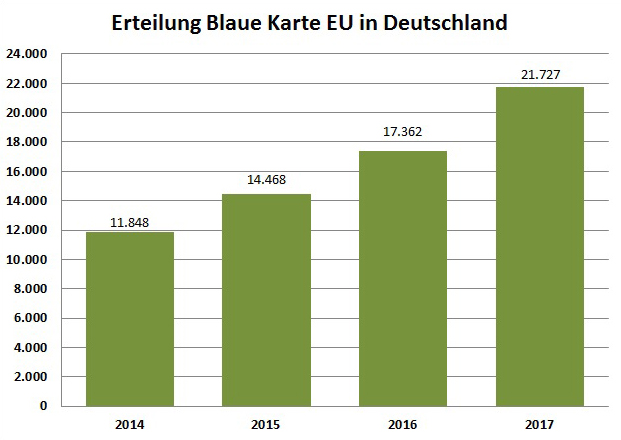I recently got the inquiry from an Australian Citizen, asking me whether he would be allowed to work in another EU country with the BLUE Card EU, he applied for in Austria.
If you have held an EU Blue Card from a Member State of the EU for at least 18 months you can enter another Member State without a visa for the purpose of highly-qualified employment and apply for the EU Blue Card there within one month. This clearly explains the misunderstanding of many of our clients: Once you got a Blue Card EU in any of the EU countries and you want to move to another country and pick up a job there, you will have to apply for the Blue Card EU in that respective country again. The same applies to the entry of family members (section 39 No. 7 of the Residence Ordinance). Besides, the holder of a Blue Card can spend up to 12 successive months in a non-EU country without losing his residence title. These same regulations are valid for family members, as well.
The Blue Card is an approved EU-wide work permit (Council Directive 2009/50/EC) allowing high-skilled non-EU citizens to work and live in any country within the European Union , excluding Denmark, Ireland and the United Kingdom, which are not subject to the proposal. The term Blue Card was coined by the think tank Bruegel, inspired by the United States' Green Card and making reference to the European Flag which is blue with twelve golden stars.
The Blue Card proposal presented by the European Commission offers a one-track procedure for non-EU citizens as t he Directive on Highly-qualified Persons to apply for a work permit, which would be valid for up to 4 years (2 years in Austria – followed by a RWR Card +), but can be renewed thereafter. Those who are granted a Blue Card will be given a series of rights, such as favourable family reunification rules. The proposal also encourages geographic mobility within the EU, between different member states, for those who have been granted a blue card. Again and to make it distinctively clear: each EU member state has its own immigration law and regulations. The Blue Card system is a harmonized Scheme which all EU member states apply, but always with their own individual immigration law. E.g.: You are not allowed to work in Italy with a Germany Blue Card. You will have to apply for an Italian Permit in this case.
The legal basis for this proposal was Article 63(3) and (4) of the Treaty of Rome (now Article 79 TFEU).
Applicants have to meet the following conditions, in order to be eligible for a Blue Card
Germany· A recognized university diploma – for unrecognized professions· A valid work contract of at least one year in the hosting state · For regulated professions – the equivalent certificate or license of profession · In case of no university degree: 5 years of work experience in particular profession are required when applying for the EU Blue Card. · Effective January 1, 2019, the minimum annual salary for non-European Economic Area nationals applying for work authorization under the EU Blue Card program in Germany will increase to EUR 53,600 per year, or to EUR 41,808 per year if the applicant will work in a shortage occupation. · An EU Blue Card will only be issued with the consent of the Federal Employment Agency, unless they graduated in Germany (section 2 subs. 1 No. 2b and subs. 2 of the Employment Ordinance). |
Austria· completed a course of study at a university or other tertiary educational institution with a minimum duration of three years,· have received a binding job offer for at least one year in Austria and the employment corresponds to your education, · will earn a gross annual income of at least one and a half times the average gross annual income of full-time employees (in 2019: at least € 62,265 which is about € 4,447 gross monthly income plus special payments), · and the labour market test (Arbeitsmarktprüfung) shows that there is no equally qualified worker registered as a jobseeker with the Public Employment Service (AMS) available for the job. · High qualified professionals have the option to apply for the Austrian Red-White-Red Card Scheme alternatively – especially in the Job shortage professions, as there is no labour market check for this kind of permit. |
Figures on the EU Blue Card
The EU Blue Card is a tool for attracting highly-qualified specialists to the European labour market from third countries. This residence title was introduced in Germany on 1 August 2012. Its legal foundation is provided by section 19a of the Residence Act (Aufenthaltsgesetz – AufenthG).
Blue Card is a tool for attracting highly-qualified specialists to the European labour market from third countries. This residence title was introduced in Germany on 1 August 2012. Its legal foundation is provided by section 19a of the Residence Act (Aufenthaltsgesetz – AufenthG).
21.727 EU Blue Cards were issued in Germany in 2017, in 2016 there were issued 17.362 permits.
From Jan. to November 2018 there have been issued 215 Blue Card EU in Austria and 8059 Red-White-Red Cards, which belong to the same High Professional Scheme.
The diagram to the right shows the figures relating to Cards issued to persons entering Germany for the first time, and to those who were already resident in the country, broken down by years.
If you are planning to assign or to hire employees from outside or to EU and you want to make sure you act according Immigration- and Labour Law, contact us here and get help: http://www.moves-consulting.com/kontakt
Written by: Kornelia Epping, Business Consultant, Corporate Immigration
Source: BAMF Germany and BMI Austria